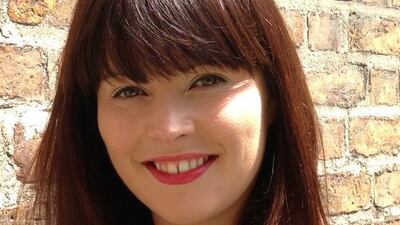Glasnevin Cemetery is the final resting place for a rich kaleidoscope of colourful Dubliners, from political heroes to romantic poets. In One Million Dubliners, the untold tales and foibles of the deceased are unearthed by the cemetery's tour guide and resident historian, Shane MacThomais. Filmmaker Aoife Kelleher, whose acclaimed short docu film Home won the award for the Best Documentary Film at Fastnet Short Film Festival, tells The National about One Million Dubliners, her first feature documentary.
What made you want to cover the grisly theme of death in your film?
I’ve always been fascinated by graveyards. Many of them, such as Père Lachaise in Paris, Highgate in London and Glasnevin itself are very beautiful and peaceful places but also teeming with life and fascinating stories – ideal settings for a documentary. I grew up on the Northside of Dublin, where the round tower on Daniel O’Connell’s tomb (in Glasnevin) is a significant presence on the skyline, so I would have known about Glasnevin from when I was a child. I wasn’t aware of any personal connection to the cemetery until I started making the documentary, when I discovered that my great-great-grandmother is buried there, but I knew that a huge number of iconic figures from Irish history, politics, art, music and literature were there, not to mention the fact that the cemetery itself was the backdrop for pivotal events, such as Patrick Pearse’s oration at the grave of O’Donovan Rossa, which was a key moment in the lead-up to the Easter Rising. Who wouldn’t want to know more about a place like that?
Can you explain the historical significance of this cemetery?
Glasnevin Cemetery was established by Daniel O’Connell in 1832, who wanted to set up a graveyard where people of all religions and none could be buried. Before the opening of Glasnevin, Irish Catholics had no cemeteries of their own in which they could bury their dead as the Penal Laws restricted the public performance of Catholic services.
What secrets of life are hidden in the Glasnevin cemetery that your documentary reveals?
The film is really about the Irish way of living and dying. There is something uniquely celebratory about the Irish attitude to life and death and about our rituals surrounding both. In the course of the film, we met an art historian, Véronique Crombé, from Paris, who has a very special connection with Michael Collins, the politician and revolutionary who died in 1922, long before Véronique was born. We also met a Vietnamese woman called Tran Thi Binh Phuong, who talked about how her family refer to those who have died in the present tense and would often eat meals at the graves of their relatives. Everyone we interviewed had a different take on life and death and on what happens when we die. That was fascinating.
What can the cemetery teach us about Ireland’s past, present and future?
We can learn so much about a country from its cemeteries – how we honour the dead and mark their passing. The historian and tour guide, Shane Mac Thomais talks about how, when he saw someone tending the grave of a parent or loved one, he regarded it as an act of devotion, comparing it to brushing their hair. Even the causes of death, which have been meticulously collected and archived since Glasnevin was first established, tell us a lot about Irish society and its inequalities.
What challenges did you come across when making the film?
The single greatest challenge was the sad and sudden passing of the wonderful Shane MacThomais, which occurred when we were editing the film. It was shocking and devastating and for a while, we found ourselves considering whether it would even be appropriate to continue with the film. But we spoke to Shane’s family and to his colleagues in Glasnevin and we found a way to keep Shane in the film in a way that honours his work and his legacy.
• One Million Dubliners (2014) is showing as part of the European Film Screenings at 8pm on 27 October today at Novo Cinema, World Trade Centre Mall Abu Dhabi, and at the same time on 28 October tomorrow at Ibn Battuta Mall Cinema
artslife@thenational.ae

